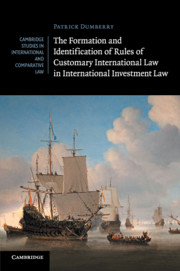Book contents
- Frontmatter
- Dedication
- Contents
- Foreword
- Preface
- Acknowledgments
- List of abbreviations
- Introduction
- 1 The concept of customary international law
- 2 Dancing with the sources: the fascinating story of the relative importance of custom and treaties at different times in the evolution of international investment law
- 3 State practice
- 4 Opinio juris
- 5 The fundamental importance of customary rules in international investment law
- General conclusion
- Bibliography
- Index
- cambridge studies in international and comparative law
1 - The concept of customary international law
Published online by Cambridge University Press: 05 May 2016
- Frontmatter
- Dedication
- Contents
- Foreword
- Preface
- Acknowledgments
- List of abbreviations
- Introduction
- 1 The concept of customary international law
- 2 Dancing with the sources: the fascinating story of the relative importance of custom and treaties at different times in the evolution of international investment law
- 3 State practice
- 4 Opinio juris
- 5 The fundamental importance of customary rules in international investment law
- General conclusion
- Bibliography
- Index
- cambridge studies in international and comparative law
Summary
Introduction
This first chapter focuses on defining the contours of the concept of customary international law in both general international law and international investment law. We will therefore not examine the different notions of custom that have been put forward by scholars and tribunals in other sub-fields of international law, such as international human rights law, international criminal law or international humanitarian law (Section 1.1). The following five questions will be addressed in this chapter.
First, we will begin with an analysis of the complex nature of custom as one of the formal sources of international law (Section 1.2). Any book dealing with the sources of law in investor-State arbitration must be solidly grounded on general public international law. The following basic (yet fundamental) questions will be examined in this section:
– Where does custom fit amongst the formal sources of international law?
– How do customary rules emerge?
– Why are customary rules obligatory?
– What is the role of the consent of States in the development of customary rules?
Second, another basic question that must be assessed at the outset of this book is the so-called double requirement of State practice and opinio juris which has been adopted by international tribunals to draw conclusions on the existence of customary rules (Section 1.3). We will briefly explore the so-called traditional and modern approaches, which have been adopted by scholars, regarding the necessity to demonstrate both requirements. This will bring us to the next issue, which is how this double requirement has been applied by investor-State arbitration tribunals. Moreover, I will examine the position that States have adopted in their pleadings and treaties regarding the necessity to demonstrate the two requirements of State practice and opinio juris.
Third, I will address the basic requirement that the party who is alleging the existence of a customary rule must demonstrate that the norm has acquired such status by presenting relevant evidence of State practice and opinio juris (Section 1.4). I will observe that this basic principle has been adopted by all investment tribunals.
Fourth, I will analyse the role played by judges and courts, including arbitral tribunals, in the formation and identification of customary rules in both general international law and investment arbitration (Section 1.5).
- Type
- Chapter
- Information
- The Formation and Identification of Rules of Customary International Law in International Investment Law , pp. 14 - 59Publisher: Cambridge University PressPrint publication year: 2016

